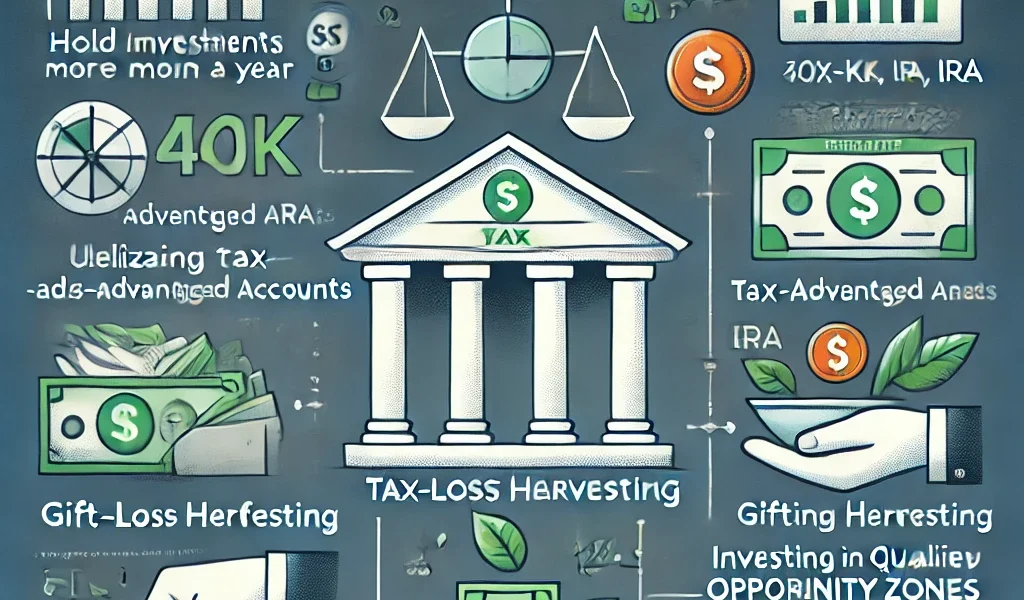Introduction
Capital gains tax is a crucial consideration for investors, property owners, and business sellers. When you sell an asset for more than you paid for it, you incur capital gains, which are subject to taxation. However, there are legal ways to minimize your capital gains tax liability. This guide will explore smart tax-saving strategies, ensuring compliance with tax laws while helping you retain more of your earnings.
Understanding Capital Gains Tax
Types of Capital Gains:
- Short-Term Capital Gains (STCG): Profits from assets held for one year or less. Taxed at ordinary income tax rates.
- Long-Term Capital Gains (LTCG): Profits from assets held for more than one year. Taxed at lower rates (0%, 15%, or 20%, depending on income level).
How Capital Gains Tax Is Calculated:
- Capital Gains = Selling Price – Purchase Price – Any Eligible Expenses
- The IRS provides different tax rates based on filing status and income bracket.
1. Hold Investments for Over a Year
One of the simplest ways to reduce capital gains tax is to hold assets for more than a year to qualify for long-term capital gains rates, which are significantly lower than short-term rates.
2. Utilize Tax-Advantaged Accounts
Investing through tax-advantaged accounts can help you defer or eliminate capital gains tax.
Options Include:
- 401(k) & IRAs: Investments grow tax-deferred, and no capital gains tax is incurred until withdrawal.
- Roth IRA: Investments grow tax-free, and qualified withdrawals are tax-exempt.
- Health Savings Account (HSA): Contributions are tax-deductible, and withdrawals for qualified medical expenses are tax-free.
3. Offset Gains with Capital Losses (Tax-Loss Harvesting)
If you have investments that have lost value, you can strategically sell them to offset gains from other investments.
How It Works:
- Short-term losses offset short-term gains.
- Long-term losses offset long-term gains.
- If losses exceed gains, up to $3,000 can be deducted from ordinary income.
- Excess losses can be carried forward to future tax years.
4. Take Advantage of the Primary Residence Exclusion
If you’re selling your home, you may be eligible for a capital gains tax exclusion of up to:
- $250,000 for single filers
- $500,000 for married couples filing jointly
Qualification Criteria:
- You must have owned and lived in the home for at least two of the last five years.
- The exclusion can only be claimed once every two years.
5. Gift Appreciated Assets to Family Members in a Lower Tax Bracket
Gifting appreciated assets to children or relatives in a lower tax bracket can help reduce capital gains tax liability.
Important Considerations:
- The annual gift tax exclusion for 2024 is $18,000 per recipient.
- The recipient may pay little to no tax if they fall within the 0% LTCG tax bracket.
6. Donate Appreciated Assets to Charity
Instead of selling stocks and paying capital gains tax, consider donating them to a qualified charitable organization.
Benefits:
- You receive a charitable deduction for the fair market value of the asset.
- The charity pays no capital gains tax when it sells the asset.
7. Use a 1031 Exchange for Real Estate Investments
If you own investment property, a 1031 Exchange allows you to defer capital gains taxes by reinvesting the proceeds into another qualifying property.
Key Rules:
- The new property must be of equal or greater value.
- The exchange must be completed within 180 days.
- A qualified intermediary must handle the transaction.
8. Invest in Qualified Opportunity Zones (QOZs)
Investing in designated Qualified Opportunity Zones (QOZs) can offer tax deferral and even tax-free gains if the investment is held long enough.
Benefits:
- Defer capital gains tax until 2026.
- Reduce tax liability if held for at least 5 years.
- No capital gains tax on appreciation if held for 10+ years.
9. Consider an Installment Sale
If you’re selling a business or real estate, structuring the sale as an installment sale can spread income over multiple years, reducing the immediate tax burden.
How It Works:
- Payments are received over time instead of a lump sum.
- Taxes are paid gradually, potentially at lower rates.
10. Maximize Your Cost Basis
The cost basis determines how much taxable gain you recognize when selling an asset. Increasing your cost basis can help reduce taxable gains.
Ways to Increase Cost Basis:
- Include purchase costs like commissions, legal fees, and improvements.
- Track reinvested dividends (for stocks and mutual funds).
11. Utilize Step-Up in Basis for Inherited Assets
When heirs inherit assets, the cost basis is stepped up to the asset’s market value on the date of death.
Benefits:
- Eliminates capital gains tax on appreciation before inheritance.
- Allows heirs to sell the asset with minimal tax consequences.
12. Be Strategic with Selling Timing
The timing of a sale can impact how much tax you owe.
Best Strategies:
- Sell in a lower-income year to qualify for a lower tax bracket.
- Delay sales until retirement, when income may be lower.
- Sell in years with significant deductions (e.g., high medical expenses, business losses).
13. Invest in Municipal Bonds
Municipal bonds offer tax-free interest income, making them a great investment for high earners looking to avoid capital gains tax.
14. Contribute to a Donor-Advised Fund (DAF)
A Donor-Advised Fund (DAF) allows you to contribute appreciated assets, receive an immediate tax deduction, and distribute funds to charities over time.
15. Consult a Tax Professional
Tax laws change frequently, and every financial situation is unique. Working with a tax professional can help you implement the most effective strategies while ensuring compliance with tax laws.
Conclusion
Reducing capital gains tax legally requires strategic planning and an understanding of tax-efficient investment and selling techniques. By using these strategies—holding investments longer, utilizing tax-advantaged accounts, leveraging tax-loss harvesting, and structuring sales wisely—you can optimize your tax position and keep more of your hard-earned profits.
Call to Action
Are you looking for ways to legally reduce your capital gains tax? Start implementing these strategies today, and consult a tax advisor for personalized guidance. Smart tax planning can save you thousands of dollars over time!




